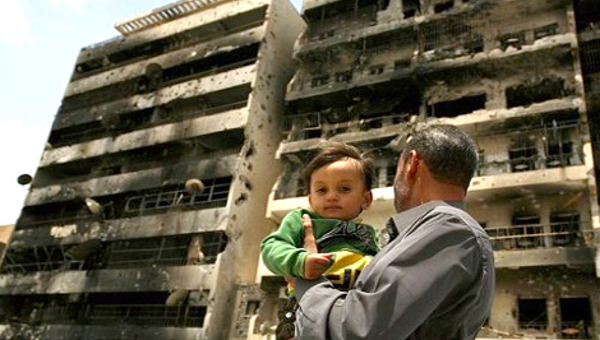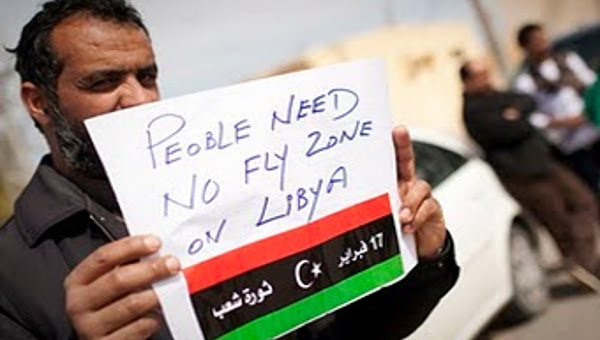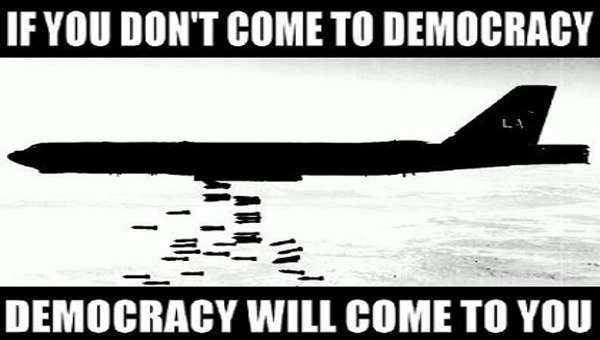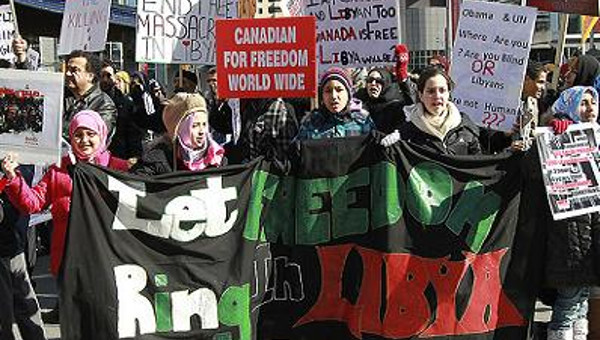The Two Wars in Libya
Two wars are being waged simultaneously in Libya. One has grown out of a revolutionary struggle for democracy; the other is an attempt by imperialism to strengthen its domination of the country. Both wars appear to share the goal of “regime change” but they stand at opposite ends of the political spectrum.
The regime change that the revolutionary struggle seeks to achieve is the overthrow of the Muammar Gaddafi dictatorship and the establishment of a system of democratic rule. As is the case in Egypt, Tunisia and elsewhere in the Arab world, the struggle for democracy in Libya encompasses diverse layers of society who have come together to achieve this goal. The more thorough the democratic transformation, the stronger will be the position of Libyan workers and their allies in the ensuing social struggles.
The struggle for democracy in Libya is an integral part of the great Arab awakening of 2011, a movement of millions of people that threatens the imperialist status quo. Victory or defeat in Libya will have a major impact on the revolutionary struggles unfolding across the region. For all these reasons, it deserves our wholehearted support.
Fighting Escalates
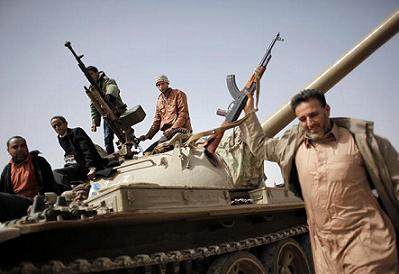
The military form of the struggle today (now with many aspects of a civil war) was largely imposed on the movement by Gaddafi’s regime. During the first couple of weeks the liberation struggle took the form of largely spontaneous uprisings in one city after another, spreading quickly across the country. Sections of the army and major figures of the regime defected. The pro-Gaddafi forces were paralyzed by the speed and power of the movement and the readiness of many to die in the cause of freedom. At this point it looked like Libya would follow the path of Tunisia and Egypt. But Gaddafi had other ideas – and the resources to implement them. He unleashed a systematic bloodbath. The insurgents were forced to take up arms to defend themselves as best they could. (The defecting army units seem to have melted away. They have played little or no role in the fighting, which has been the work of heroic but untrained and ill-equipped volunteers.) Gaddafi’s forces took no quarter, murdering many peaceful demonstrators and reducing entire cities to rubble. Gradually they gained the upper hand and began to march toward Benghazi, the heart of the insurrection.
The U.S. and its NATO partners are waging a very different war. It took only a few days for them to transform the supposed UN-sponsored police action to protect civilians into an all-out war against Libya. The “regime change” they want is to replace the Gaddafi clique with clients who can defend their interests more reliably. The NATO allies also hope to cow the rebellious Arab peoples with a demonstration of how foreign powers can still frustrate their attempts to win freedom. This is a reactionary war without an ounce of progressive, humanitarian content.
Resolution 1973 of the United Nations Security Council (UNSC), adopted on March 17, gave the green light to foreign intervention in Libya. A wide-ranging debate in liberal and left-wing circles has ensued, with figures such as Gilbert Achcar and Juan Cole supporting the resolution’s call for a no-fly zone to protect civilians and others opposing it. (Ed.: see Bullet No. 483 and more articles on the Links International Journal of Socialist Renewal website.)
Debate Superseded by Events
While this writer is in the latter camp, the debate over the no-fly zone has been superseded by subsequent events. There is little value in continuing to discuss whether the intervention authorized by the UNSC resolution “saved” Benghazi from imminent massacre, whether one might in principle somewhere at some time support foreign intervention, or whether certain historical precedents apply in this case. The Libyan people aren’t facing an abstract no-fly zone. They are the victims of a far-reaching imperialist assault that includes cruise missile attacks, a naval blockade, bombing of military and strategic infrastructure targets, close-in air attacks (the so-called no-drive zone) and any other facilities and assets the NATO commanders wish to destroy. A growing number of reports attest to the presence of boots on the ground of special forces from France, Britain and the United States, some of whom are “training” the insurgents.
This assault on the Libyan people was the real objective behind the smokescreen of a no-fly zone. Indeed, the UNSC resolution was carefully worded to allow for an open-ended escalation of the conflict by NATO.
How has the situation evolved in recent weeks?
On the ground in Libya, the fighting has produced a somewhat unstable equilibrium. On the eve of the foreign intervention the rebellion was in desperate straits, reeling from a string of military defeats. Now the rebel forces have consolidated their position in Benghazi, the country’s second-largest city, and in the cities and towns further east. West of Benghazi, a see-saw battle continues on the road from Ajdabiya to Brega. Further west, Misurata, the third-largest city located between the Gaddafi strongholds of Tripoli and Surt, remains largely in the hands of the insurgent local population who have resisted weeks of merciless heavy bombardment from loyalist forces. The Gaddafi loyalists have consolidated their hold on the western part of the country, often through ruthless repression of cities and towns that dared to rebel during the first phase of the uprising.
It must be noted, though, that the pro-democracy forces have paid a huge political price for the respite that they have achieved in the east of the country. The imperialists have succeeded in entangling Libya’s war for democratic freedoms with their war against the country’s sovereignty. The rebel bands – still very far from a coherent armed force – are far too weak to defeat the loyalists without military
assistance from the outside powers. The air war and the advance or retreat of the rebels on the ground appear as complementary activities of a single strategy. (The denials notwithstanding, it strains credulity to believe that the fighting and bombing are not being closely coordinated.) The indigenous character of the freedom struggle risks being overshadowed by the war of aggression of the great powers. Meanwhile the imperialists lay claim to the mantle of the freedom fighters.
Political Retreat
This observation is not meant as criticism from afar of the leaders of the rebellion or a form of “what if” speculation. Rather it is offered as an assessment of the situation as it has evolved; we should not close our eyes to the political retreat from the moral high ground, independent of the ebbs and flows of the military struggle.
Whether or not the insurgency could have pursued another course is a different matter. They had to contend with many constraints over which they had little or no control – not
only Gaddafi’s murderous refusal to yield an inch, but also the specific history, culture and social structure of Libya. They were forced to wage their
struggle under conditions much less favourable than those faced by their counterparts in Egypt, for example.
Quite apart from the political retreat of the opposition, it is apparent that the imperialist war has
greatly strengthened Gaddafi’s political standing within Libya and internationally, allowing him to appear as the defender of the unity and sovereignty of the
nation, thereby appealing to wavering elements and strengthening the resolve of his loyalists to fight on. Indeed, the disintegration of the dictator’s forces came to an end and the loyalist counteroffensive began just as the NATO powers’ threats of war reached their peak. Gaddafi’s hand is further strengthened by the “collateral damage” produced by the Western air attacks. Despite the
silence of the mainstream media, the civilian victims are no doubt numerous.
Should we therefore conclude that the entanglement of the two wars in Libya means that the
revolutionary democratic struggle has been defeated? Has the anti-Gaddafi rebel movement been reduced to a simple appendage of the NATO forces who aim to
conquer and rule Libya in the interests of imperialism? Are the rebels the new Quislings?
Struggle for Democracy is Still Alive
That is certainly one possible outcome of the current situation and a number of contributions posted here and elsewhere argue along these lines. But in my opinion such a conclusion is premature. It is also unduly pessimistic. The revolutionary struggle for democracy is still alive and its future course remains an open question.
We should note the repeated complaints from the British and U.S. leaders that they “do not know” the leaders in Benghazi. Of course they know them. They are saying that they do not trust them – they are not sure that the base, the rebel fighters, who are armed, will submit to the big powers’ plans for the country or that the Benghazi leaders will be able to keep their base under control, above all in
the context of the wave of change sweeping the region. Moreover, the continuing resistance in Misurata and the lengthy resistance in Zawiyah, a city just west of Tripoli, attest to the deep-rooted, plebeian, and nation-wide character of the freedom struggle. Future developments in the region, particularly inneighbouring Tunisia and Egypt, will also influence the outcome of the struggle.
Still, the situation remains highly fluid and we should remain alert to the shifting political sands in Libya. •
This article first appeared on the Links International Journal of Socialist Renewal website.


